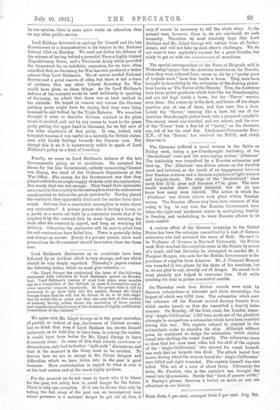In the Lords on Tuesday there was a most important
and useful debate—a debate of the kind which makes the serious part of the public draw comparisons with the House of Commons by no means favourable to that body. Lord Midleton, in a speech of very high ability, moved that it was incumbent on the Government to reduce civil expenditure. He most cogently pointed out that the army of officials who sprang into existence under the late Government's schemes of "Social Reform" stood for a prodigal and unnecessary expen- diture. Between now and Christmas economies amounting to between 25,000,000 and 810,000,000 could easily be made in the various Departments. The Government accepted the motion, Lord Lansdowne promising that the most careful scrutiny should be exercised, and that where control was now insufficient it should be made more rigorous. Lord St. Aldwyn hoped that the working classes, who had chiefly profited by the war, would be embraced in any new scheme of taxation. Lord Haldane protested against economies in education. A well-educated nation would be more than ever necessary in the commercial struggle after the war. Yes ; but is Lord Haldane sure that an expensive education is a good one P
In our opinion, there is more pure waste on education than on any other public service.



































 Previous page
Previous page